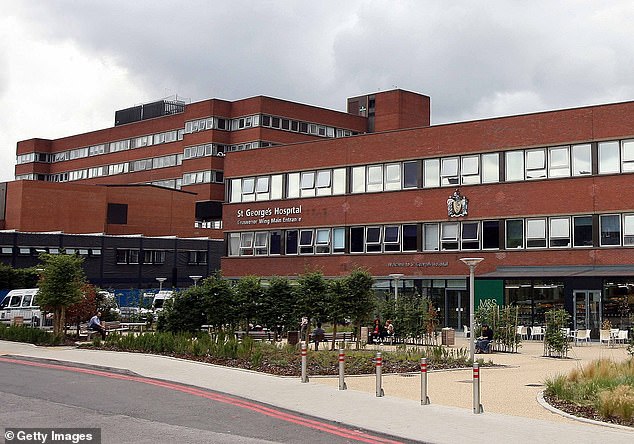A health boss has warned norovirus can ‘rip through wards like wildfire’ as a major hospital was forced to close three sick bays due to the vomiting bug.
St George’s Hospital, in Tooting, south-west London, has taken action to help reduce the risk of the infection spreading.
This has meant some bays or wards had to be closed to admissions and transfers, in order to to protect new patients.
It comes as data from NHS England shows cases of the bug are still climbing and health chiefs are urging people to wash their hands.
Professor Arlene Wellman MBE, Group Chief Nurse for St George’s, Epsom and St Helier, said: ‘Once norovirus enters a hospital, it can rip through our wards like wildfire, making patients even sicker.
‘We are doing everything we can to limit the spread, but you can help us.
‘Hand sanitisers such as alcohol gel do not kill the bug – the simple act of good hand washing with soap and water can make all the difference between our beds being used to care for patients, or lying empty at a time when every bed is precious.’
Symptoms for Norovirus usually last for two to three days, however, people may be infectious for up to 72 hours after symptoms have stopped, therefore they should avoid visiting hospitals or care facilities.

It comes after yesterday England’s norovirus was laid bare with an interactive map revealing the rates of the vomiting bug are five times higher in some areas.
The North East and Yorkshire has been hit hardest by the virus with over 2,500 hospital beds in total occupied last week — 5.1 times the level recorded in the East of England.
Concerning figures also showed norovirus cases in England have once again soared to the highest level seen in hospitals this winter.
Rates of the bug, which can also cause diarrhoea, are up 69 per cent on the same time last year nationwide.
Over 960 patients a day were in hospital in England with norovirus last week, up from 898 in the previous week.
Officials said ‘pressure on hospitals remains incredibly high’ and urged Brits to keep frequently washing their hands to thwart transmission of the highly contagious virus.
The majority of people will not need to speak to a doctor about a norovirus infection. In most cases, it will clear up on its own.
But for those who are more vulnerable — typically the elderly, young and immunocompromised — it could lead to dehydration, resulting in hospitalisation.

According to the weekly NHS data, a total of 2,575 hospital beds in the North East and Yorkshire were either taken up or closed because of diarrhoea, vomiting and norovirus-like symptoms.
Sheffield Teaching Hospitals NHS Foundation Trust reported the highest number of beds occupied or closed within the region, at 584 in total last week.
This was followed by York and Scarborough Teaching Hospitals NHS Foundation Trust and The Rotherham NHS Foundation Trust with 389 and 339 respectively.
The Midlands, meanwhile, recorded a total of 1,940 beds occupied or closed.
The Royal Wolverhampton NHS Trust (403) and Chesterfield Royal Hospital NHS Foundation Trust (356) accounted for over a third of all cases in the region with 759 cases combined.
In the South West, a total of 1,555 beds were occupied or closed, with University Hospitals Bristol and Weston NHS Foundation Trust accounting for a third alone (563).
The North West and South East of England reported a total of 993 and 935 beds in total.
By contrast, London and the East of England recorded 516 and 501 over the week.

Professor Julian Redhead, NHS national clinical director for urgent and emergency care said: ‘Hospitals are continuing to treat hundreds of patients who are ill with the highly infectious and unpleasant norovirus bug, with the rate of cases at the highest level recorded for this time of year since 2020.
‘The twin pressures of winter viruses and problems discharging patients means hospitals are close to full — even as more beds have been opened to manage the increased demand.
‘While pressures on hospitals remains incredibly high, it’s vital people continue to use NHS services in the normal way — using 111 and 111 online if you need advice and support for health conditions, and only using 999 or attend A&E in life-threatening emergencies.’
UK Health Security Agency epidemiologist, Amy Douglas, added: ‘Norovirus cases are way above what we would usually see at this time of year and outbreaks in hospitals continue to rise.
‘Just because you’ve had norovirus doesn’t mean you won’t get it again.
‘It’s really important that if you have diarrhoea and vomiting, you take steps to avoid passing the infection on.
‘Please avoid visiting people in hospitals and care homes to prevent passing on the infection in these settings.
‘Do not return to work, school or nursery until 48 hours after your symptoms have stopped and don’t prepare food for others in that time either.
‘This is because you can still pass on the virus in the days after you stop being sick.’
She said: ‘Washing your hands with soap and warm water and using bleach-based products to clean surfaces will also help stop infections from spreading.
‘Alcohol gels do not kill norovirus so don’t rely on these alone.
‘Norovirus infections can cause dehydration, especially in vulnerable groups such as young children and older or immunocompromised people, so if you do get ill it is important to drink plenty of fluids during that time.’
It has been estimated that for every case of norovirus reported to national surveillance in the UK, there are roughly 288 in the community that go unreported.
The bug is usually spread through close contact with someone who is infected, or by touching surfaces or objects, or eating food someone infected has touched.
Most of those infected suffer nausea, diarrhoea and vomiting and recover at home.
